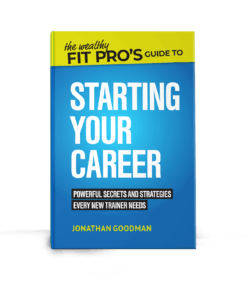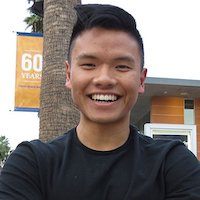You’re good enough to get a personal training certification, but you’re not really a trainer until you have clients to train. For that, you need to land your first job. Which means you have to survive your first job interview. Only then does the game truly begin.
That first interview is daunting no matter how fit or confident you are.
I’ve known people with degrees and credentials, not to mention biceps bigger than my face, who couldn’t break through to their first training job. I was almost one of them. I bombed my first job interview at a commercial gym, even though I had an endorsement from one of the gym’s most respected trainers.
Not getting that job lit a fire inside me. I realized I couldn’t work as a trainer until I worked on my self-presentation. My second interview resulted in a job offer. Same with my third. Same with my fourth. Same with the next 20. In fact, every subsequent interview, at just about every kind of gym, has resulted in an opportunity to work there.
I’ve turned down most of them, since they weren’t a clear enough upgrade over what I was doing at the time. But I guarantee it felt good to have those options.
Let’s talk about how you can share the feeling. If you’re trying to score your first job offer or just want to improve your interview skills for that next-level gig, here are the key areas you need to master.
Training and nutrition
A typical personal trainer job interview begins with small talk, followed by progressively more difficult fitness questions, with topics ranging from how you would regress an exercise to the mechanisms that cause fatigue.
Interviewers are usually trainers who know more than you. It’s easy to be intimidated, but that’s not the point. They don’t expect you to know what they know. They’re trying to see how you react to being stumped.
You need to give accurate and coherent answers to basic questions, especially when they’re directly related to the job you’re applying for.
But you also need to be transparent with what you don’t know. Don’t try to fake your way through it. An expert will be able to tell. Be honest and stay positive by showing a desire to learn it.
Here’s an example:
Interviewer: “Can you describe the difference between anterior and posterior pelvic tilt to me, and how they apply to different scenarios of training?”
Bad response: “Anterior pelvic tilt is more anterior, you know? And posterior tilt is, like, less anterior. Because it’s posterior. And some people think one of them is clearly bad, but who am I to judge?”
Good response: “I’ve heard the terms before, and I know they’re important. Anatomy and biomechanics are not currently my strong suit, but I’m passionate about learning anything that serves the client better.”
READ ALSO: Five Basic Exercise Principles Every Trainer Must Know
What if I disagree with the interviewer?
Even the best trainers disagree on lots of issues. It’s scary when one of them is the person who’s making such a big decision about your career. But again, it’s better to be transparent on where you stand, rather than saying what you think the interviewer wants to hear.
Here’s an example that happened to me:
Interviewer: “Why is it important to recommend our clients consume a fast-digesting protein, like the one in our supplements, after their workouts?”
My response: “I don’t think post-workout protein is that important for beginners and intermediate lifters, like the clientele here. Research shows it makes very little difference. Furthermore, while a fast-digesting protein might be better than a slower one, net protein balance should be similar, so respectfully, I don’t think that’s a recommendation I’d feel comfortable making.”
Because I provided a solid explanation for how I arrived at my stance, the interviewer respected my honesty, and offered me the job.
If he hadn’t, he would’ve been doing me a favor. Why would I want a job where I have to push supplements on clients based on a rationale I didn’t agree with?
READ ALSO: Where to Work as a Personal Trainer
Coaching and interpersonal skills
If you get to this part of the interview—lots of would-be trainers don’t—you’re doing pretty well. It means you have a solid understanding of training and nutrition.
But as important as that is, you don’t attract clients by dazzling them with your knowledge. The art of coaching involves connecting with people and simplifying concepts.
The interviewer will probably do some role-playing with you, or take you out on the gym floor to talk to members. If your entire personality is defined by the fact you work out, you’ll never get hired.
Some common questions:
“What do you like to do for fun?”
They want to hear that you’re active and walk the walk, but also that you have hobbies and passions outside the gym. Fitness alone is not interesting to the average client.
“How do you build rapport with clients?”
They want you to describe how you break the ice and connect with people, and also get a sense that you genuinely enjoy it and look forward to the opportunity.
“How will you help clients reach their goals?”
What they don’t want are details of macronutrient timing or your periodized 12-month training cycle. They want to hear you describe simple, practical steps their members are more likely to appreciate and adhere to.
“How do you retain a client for a long time?”
The answer to this is simple: Build a strong relationship and help them get great results.
You may also hear questions to tease out whether you’ll be a team player alongside the other trainers, or if you’ll be a good brand ambassador outside the gym. All these inquiries are tests of your communication skills.
READ ALSO: How to Get More Clients and Referrals
Sales
Questions about selling and marketing usually come up toward the end of the interview. It’s not because they aren’t important. It’s because nearly every new trainer is terrified of sales, and they don’t want to scare you off.
Selling is a non-negotiable part of personal training. At most gyms, you won’t get any clients until you sell them on your service.
Here’s a paradox: If you ace this part of the interview, showing sales chops that would make Zig Ziglar jealous, you would get the job even if you don’t know the first thing about fitness. But if you don’t know anything about fitness, you’ll never get to this part of the interview.
The interviewer will probably take you through a mock sales meeting. (It’s often a bad sign if they don’t; it suggests they don’t take the process seriously, an oversight that could eventually doom their business.)
The mock sales meeting can go a few different directions. They may ask you to sell them a personal training package, or sell a post-workout protein bar to someone on the gym floor. Or they may ask you to sell the shoes you’re wearing, or a paperclip on the desk.
The scenarios are endless. The more outlandish ones are designed to see if you’ll crumble like a house of cards, as lots of otherwise qualified trainers do.
What matters isn’t that you’re a great salesperson now. At minimum, they want to see if you can keep your composure and show a desire to get better. Even better is if you can demonstrate basic competency.
But how can you do that if you’ve never sold training before? A few key principles:
Be a human being
You’re helping a person solve a problem. That’s what you’re selling. The more you make it about the other person, the less self-conscious you’ll feel.
Talk as little as possible
Ask the prospect questions and listen to their answers, with the goal of learning what they need. Only then can you make the case for why your service will help them achieve it.
Find the pain point
When the prospect says they want to lose weight or build muscle, ask why.
“I want to look better” is not a good enough answer. Why do they want to look good? Dig far enough, and eventually they’ll admit it’s because they want to be a good role model for their kids, or their spouse isn’t attracted to them anymore.
READ ALSO: How to Help Your Clients Find Their "Why"
Sell benefits, not features
Once you find their emotional pain point, focus on the benefits of your service—the confidence to wear any clothes they like, the energy and mobility to play with kids or grandkids, or whatever they’ve told you is important to them.
Don’t talk about how your workout program promotes lipolysis, or why your five personal training certifications make you uniquely qualified to solve their problem.
Stay silent after you’ve pitched
The only thing worse than underselling your service is overselling. Stop selling after you’ve made your proposal. Wait for them to respond, no matter how uncomfortable it feels.
Anticipate objections
You’ll rarely get through a sales meeting without hearing an objection. You need to be prepared for the most common ones: price, time, and scheduling concerns.
You don’t need to have great answers, especially if the interviewer knows you’ve never sold personal training packages to actual clients. You just need to show you anticipated objections and came prepared to address them.
READ ALSO: How to Sell Personal Training in Five Steps
How to prepare for an interview
As you’ve seen, a successful interview comes down to three factors within your control:
- Fitness knowledge
- Coaching skill
- Sales potential
The less confident you are in these areas, the more you need to prepare. I recommend two ways to do it:
- Find an experienced trainer, ideally someone who’s worked for the gym where you hope to work, and ask them to help you do a practice interview.
- Train friends or family for free to get coaching experience. Ask for their feedback to help you understand the training experience from the client’s perspective.
READ ALSO: How to Turn a Complimentary Training Session into a Long-Term Client
Final thoughts
If you’re interviewing for your first personal training job, your personality, passion to serve, and desire to improve often matter more than your current abilities. You can only know what you’ve had the opportunity to learn.
The same applies to experienced coaches looking for a new opportunity. You don’t have to be perfect. But you do need to be honest about what you know or don’t know, and what you have or haven’t done.
At any level, from complete beginner to master trainer, your interviewer is looking for someone who’s hungry to help people, and who people will want to work with.
Be that person, and you’ll land the job. Best of luck to you.
Ready to Start Your Personal Training Career?
 Starting your career isn’t complicated. All you need is for someone to pay you to train them.
Starting your career isn’t complicated. All you need is for someone to pay you to train them.
But how do you get that first client? What do you need to know? Where do you want to work, and how do you get hired?
If your answer to any of those questions is “I don’t know,” you need The Wealthy Fit Pro’s Guide to Starting Your Career, the ultimate launching pad for ambitious personal trainers.
Jonathan Goodman will show you how to …
- Land the perfect job for you (pg. 17)
- Attract more clients (pg. 95)
- Keep more clients (pg. 55)
- Get even more clients through a foolproof referral system (pg. 115)
- Learn the no-fail secret to motivating clients (pg. 61)
- Set yourself apart with programs your clients will brag about (pg. 71)
- Master marketing skills that open up new income opportunities (pg. 152)
- Become the best trainer you can be (pg. 46)
If you’re just beginning your journey in the fitness industry (or know someone who is), you won’t find a more authoritative or comprehensive resource.
Order this book in paperback today and get the audiobook and ebook 100% free (a $40 value).
It all starts by clicking here: The Wealthy Fit Pro’s Guide to Starting Your Career










